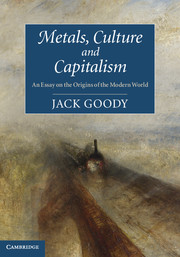Book contents
- Frontmatter
- Contents
- Maps
- Plates
- Preface
- Acknowledgements
- Chronology
- Part I Explorers
- 1 The Age of Metals in the Ancient Near East
- 2 A Bronze Age without bronze
- 3 Metals and society
- 4 Trade and religion in the Mediterranean
- 5 The coming of the Iron Age and classical civilisation
- 6 After the Romans
- Part II Merchants
- Part III Accumulators
- Appendix 1 The metallurgy of iron
- Appendix 2 Damascene steel and blades
- Glossary (with the aid of J. A. Charles)
- Bibliography
- Index
- Plate section
3 - Metals and society
Published online by Cambridge University Press: 05 June 2014
- Frontmatter
- Contents
- Maps
- Plates
- Preface
- Acknowledgements
- Chronology
- Part I Explorers
- 1 The Age of Metals in the Ancient Near East
- 2 A Bronze Age without bronze
- 3 Metals and society
- 4 Trade and religion in the Mediterranean
- 5 The coming of the Iron Age and classical civilisation
- 6 After the Romans
- Part II Merchants
- Part III Accumulators
- Appendix 1 The metallurgy of iron
- Appendix 2 Damascene steel and blades
- Glossary (with the aid of J. A. Charles)
- Bibliography
- Index
- Plate section
Summary
Concerning all this earlier activity relating to the search for and the processing of metals, Childe makes an important point about the inventiveness of humanity and the uniqueness of their discovery:
The sciences applied in metallurgy are more abstruse than those employed in agriculture or even pot-making. The chemical change effected by smelting is much more unexpected than that which transforms clay into pottery. The conversion of crystalline or powdery green or blue ores into tough red copper is a veritable transubstantiation. The change from the solid to the liquid state and back again, controlled in casting, is hardly less startling. The actual manipulations themselves are more intricate and exacting even than those involved in pot-making, spinning or boat-building.
Childe suggests that the processing of copper, initiating the Age of Metals, led to the emergence of specialists that were withdrawn from the process of primary production itself. ‘Metallurgy’, he wrote, ‘is a full-time job’. There is certainly a considerable specialisation involved in metal-working and Childe was right about the role of metallurgy, but not altogether correct in saying this was necessarily full-time. Recently in Africa, I knew a number of iron-workers, smiths, among the LoDagaa of Northern Ghana, but none were full-time. Low-grade iron ore, in the form of laterite, was available everywhere. They worked at iron and ran smithies, though as we will see in Chapter 9 the critical smelting had by then been replaced by the importation of cheap metal, mass-produced by casting in European factories like the ones at Middlesbrough in northern England, a technique which came late to Europe. Africa had simple forges, but no smelting now since the cast iron was purchased ready-made (Map 3). The smiths, like my friend Bonyiri among the LoDagaa, were part-time, farming as anyone else the rest of the day. The money people made from the forge they dedicated to its shrine, although using the money for daily living.
- Type
- Chapter
- Information
- Metals, Culture and CapitalismAn Essay on the Origins of the Modern World, pp. 42 - 61Publisher: Cambridge University PressPrint publication year: 2012



